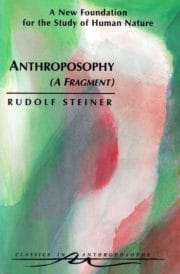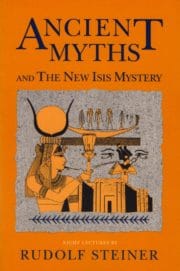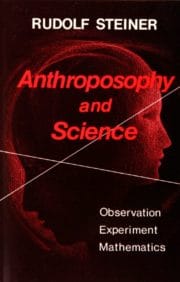Fruits of Anthroposophy
These talks offer a fresh and exceptionally clear approach to the anthroposophical path of knowledge. Imagination is described as broadening our experience of memory to cosmic dimensions. Inspiration is described as an extension of forgetting. And Intuition is shown to be the way that the spiritual world bears fruit for the future of human evolution. Steiner also discusses the difference between our causal explanations of natural world around us and the “moral world order” and its relationship to human morality and freedom.
Anthroposophy and its methods are described not as a new “religion” but as a path of knowledge that helps us to overcome our habitual ways of seeing and and to truly perceive both the sensory world and the suprasensory world.
Content
Introduction
- Effects of Modern Agnosticism
- Perception and Thinking
- The Tragedy of F. Nietzsche
- The Relationship between Goethe and Hegel
- From Sense Perception to Spirit Imaging
- From Imaginative Knowledge to Inspirational Knowledge
- VII. The Gulf Between a Causal Explanation of Nature and the Moral World Order
- VIII. The Social Question
About the Author
Rudolf Steiner (1861–1925) was born in the small village of Kraljevec, Austro-Hungarian Empire (now in Croatia), where he grew up. As a young man, he lived in Weimar and Berlin, where he became a well-published scientific, literary, and philosophical scholar, known especially for his work with Goethe’s scientific writings. At the beginning of the twentieth century, he began to develop his early philosophical principles into an approach to systematic research into psychological and spiritual phenomena. Formally beginning his spiritual teaching career under the auspices of the Theosophical Society, Steiner came to use the term Anthroposophy (and spiritual science) for his philosophy, spiritual research, and findings. The influence of Steiner’s multifaceted genius has led to innovative and holistic approaches in medicine, various therapies, philosophy, religious renewal, Waldorf education, education for special needs, threefold economics, biodynamic agriculture, Goethean science, architecture, and the arts of drama, speech, and eurythmy. In 1924, Rudolf Steiner founded the General Anthroposophical Society, which today has branches throughout the world. He died in Dornach, Switzerland.












Reviews
There are no reviews yet